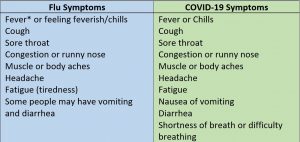While every flu season is unpredictable, the 2020-2021 season will certainly be unique as the COVID-19 pandemic still looms. The prospect of the flu season during the coronavirus pandemic leaves health experts looking for answers. COVID-19 has already claimed the lives of over 170,000 Americans and the flu usually accounts for tens of thousands of deaths. No one knows what to expect as fall approaches, but we do know that prevention is key.
Researchers have little evidence about how COVID-19 might affect the course of the flu season, however the CDC believes it’s likely that flu viruses and COVID-19 will both be spreading. While there is currently not a vaccine for COVID-19, the flu vaccine is the best way to help protect against the flu. In addition to the precautions already set in place to reduce the spread of COVID-19 such as wearing masks, social distancing, hand washing, and limiting large gatherings, are also good practices for preventing the flu as well. Even though getting a flu vaccine will not protect you against COVID-19, it can still reduce your risk of becoming seriously ill from flu and even dying from it.
 The flu season typically runs from October through April and according to Dr. David Banach, Hospital Epidemiologist at UConn Health, and the CDC, it’s best to receive your flu shot in September or October.
The flu season typically runs from October through April and according to Dr. David Banach, Hospital Epidemiologist at UConn Health, and the CDC, it’s best to receive your flu shot in September or October.
Everyone over six months of age should get a flu vaccine, however, it is especially important for people who are at high risk from complications from influenza including people 65 years and older, people of any age with certain chronic medical conditions (such as asthma, diabetes, or heart disease), pregnant women and children younger than 5 years, but especially those younger than 2 years old.
It takes about two weeks after vaccination for antibodies to develop in the body and provide protection against influenza virus infection.
When a health professional injects the vaccine into a person’s body, the person’s immune system starts to develop antibodies to fight the illness — even though the virus is inactive.
If a person comes into contact with the flu virus again, their body will recognize it and already has the right antibodies to attack it quickly and keep a person from getting sick.
“Most flu shots do not contain live virus and can’t cause flu infection. The nasal spray flu vaccine contains weakened (attenuated) viruses so that it does not cause flu illness,” says Banach.
It’s still safe to visit your doctor or pharmacy for the flu clinic, if you minimize contact, call ahead, and follow protocols to minimize exposure to others suggests Banach. Doctors’ offices and pharmacies are following protocols to make sure that those seeking vaccination for the flu can do so safely.
Flu and COVID-19 symptoms overlap and many people may experience mild illness and do not require medical care. If you get sick with flu or COVID-19 symptoms, in most cases, you should stay home and avoid contact with other people except to get medical care.
If, however, you have symptoms of flu or COVID-19 and are in a high-risk group, or are very sick or worried about your illness, contact your health care provider. Tests can be performed for both to determine which virus you are dealing with and provide treatment with antiviral drugs for the flu that can lessen symptoms and shorten the time you are sick by 1 or 2 days. They also can prevent serious flu complications.
The bottom line, regardless of COVID-19, but even more so because of its existence, it’s important to get a flu shot every year.
For more information visit UConn Health.



